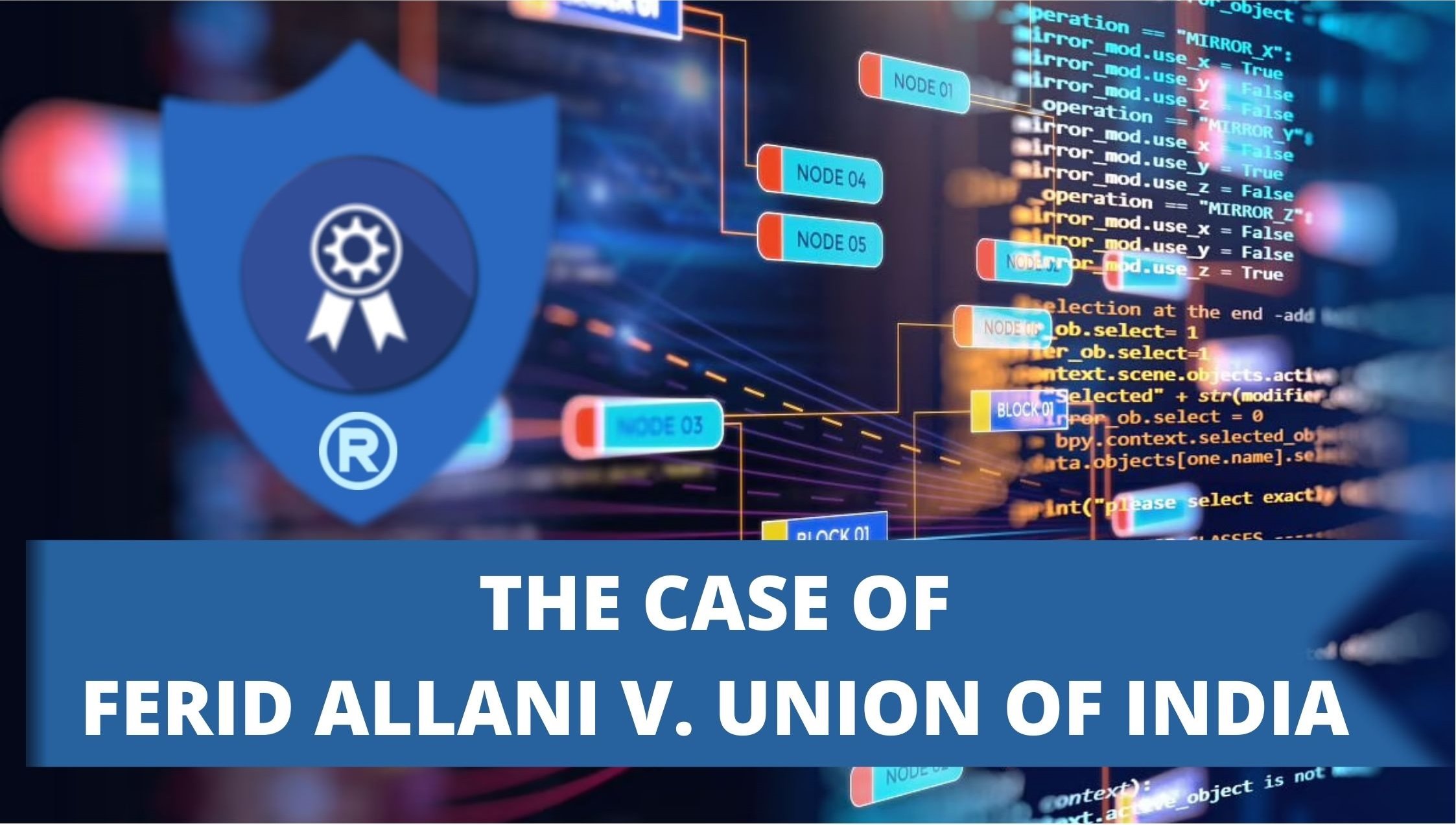THE CASE OF FERID ALLANI V. UNION OF INDIA
Patent is a sole right given to an inventor for his work by the government for a fixed period of time. It prohibits anybody apart from the inventor himself to misuse his work without his knowledge or authorization. It provides him legal protection and a right of exclusiveness for all the time and effort invested by him in his creation. Almost everything that is fixed and is stationery can be patented. One such thing is the patentability of computer related inventions.

The case of Ferid Allani V. Union of India throws light upon the patentability of computer-related inventions. The judgement of the Hon’ble Delhi High Court, in this case, opened a new range of vision for software development in our country and gave a major boost to inventions related to computers and their patentability thereafter.
A patent is a sole right given to an inventor for his work by the government for a fixed period of time. It prohibits anybody apart from the inventor himself to misuse his work without his knowledge or authorization. It provides him legal protection and a right of exclusiveness for all the time and effort invested by him in his creation. Almost everything that is fixed and is stationery can be patented. One such thing is the patentability of computer-related inventions. The Patents Act, 1970 provides with certain parameters like Novelty or Non-obviousness to ensure that the work is worth being patented, post which the invention gets registered under the government and gets legal protection. It also provides recognition to Section 3 of the Act which mentions as to what is not an invention and states that “a mathematical or business method or a computer program per se or algorithms” is not an invention and hence not patentable.
The case of Ferid Allani (Petitioner) V. Union of India (Respondent) was in respect of a method and device for accessing information sources and services on the web. The application for the patent filed by the petitioner consisted of method claims and system claims. The Patent Office rejected the application on the grounds that the claims lacked novelty and hence could not be patented.
FACTS OF THE CASE:
The Petitioner, i.e. Ferid Allani, who is a citizen of Tunisia, filed a patent application seeking grant of a patent which was rejected by the Patent Office on the grounds of lack of novelty and patentability as per Section 2 (1)(j) and Section 3 (k) of the Act. The application consisted of both method claims and system claims. Method Claims are active steps undertaken to achieve a certain result, whereas, system claims define the invention in terms of its components. The preliminary report that was rejected by the Patent Office was followed by a more detailed examination later on. The case was taken before a single judge court where the judge demanded from the Patent Office to give reasons for their rejection, which was given by them on a later date of 18th November 2008 stating that the claims lacked novelty and there were no inventive steps as per Section (2)(j) of the Act. Aggrieved by the rejection, the petitioner appeared before the Intellectual Property Appellate Board (IPAB) which was dismissed by them stating a lack of technological advancement and effect. Thereafter, Ferid Allani challenged this decision before the Hon’ble Delhi High Court which ordered for a re-assessment of the patent application.
FINDINGS AND CONCLUSION OF THE HON’BLE HIGH COURT:
The Hon’ble Delhi High Court was of the view that the guidelines of the IPAB were introduced after the order of the Tribunal, hence the application must not be assessed on the basis of those guidelines. The Court held that, as per Section 3(k) of the Act, any novel inventions for patents could not be rejected and does not make any invention non-patentable merely because it is computer-based, in fact, the words per se were added to it to ensure that the inventions based on computer programs are not refused patents. The Court also held that the prevention of such computer-related inventions from being patented can prove to be fatal for modern society as it occupies a huge part in it and contributes to its growth. Finally, after a long legal battle, the High Court granted Ferid Allani with a patent by IPAB. This decision given by the High Court of Delhi opened new ways for more computer-related inventions as they received huge recognition in this case. It completely changed the outlook of the Patents Office towards such inventions and ensured that there is no blockage and misuse of the Patents Act. The order also appears to signify that practices of other foreign patent offices in addition to guidelines and judicial precedents may be relied upon while evaluating patentability of computer-related inventions.
In one such case of Alice Corp V. CLS Bank International, the Court held that patents could not be issued to any rough or conjectural ideas merely because they were computer-related. It is only when these ideas contribute to the development and performance of computers, that patentability should not be restricted. In toto, the Court is of the view that any computer-related invention that has a technical effect or contribution is patentable in India.
In the contemporary world, it becomes unimaginable for human life to exist without computers or computer-related inventions. The present case of Ferid Allani contributes to the development of such computer-related patents in our country, India. It boosts the confidence of the investors and creators of different software. The revised standards of computer-related inventions make this case a landmark judgement to enhance the technical advancement of this country.
TO KNOW MORE ABOUT PATENTING SOFTWARES AND WEBSITES, WATCH THIS VIDEO -
BY - RIDHIKA KAPOOR












